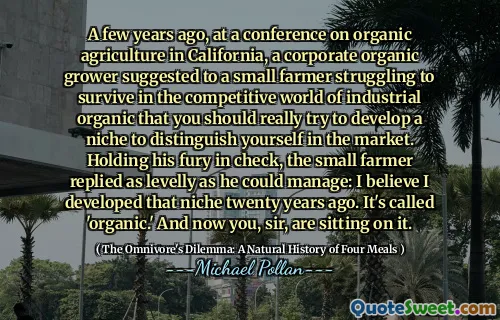
A few years ago, at a conference on organic agriculture in California, a corporate organic grower suggested to a small farmer struggling to survive in the competitive world of industrial organic that you should really try to develop a niche to distinguish yourself in the market. Holding his fury in check, the small farmer replied as levelly as he could manage: I believe I developed that niche twenty years ago. It's called 'organic.' And now you, sir, are sitting on it.
This quote highlights the tension and irony between large corporate entities entering the organic agriculture market and the small, pioneering farmers who have laid the groundwork for organic farming long before it became profitable or trendy. The small farmer's response is a powerful reminder that what is often seen as 'developing a niche' is in fact reclaiming or riding the coattails of years of dedication and hard work by those who truly embodied the values behind that niche. It speaks to the authenticity and commitment embedded in the term "organic"—not just a market segment but a philosophy and way of life cultivated over decades. The corporate grower's suggestion inadvertently overlooks the heritage and struggles of the smaller players who risk their livelihoods to maintain organic standards and practices in the face of industrial pressures.
Moreover, this dialogue succinctly critiques how commercialization can sometimes overshadow tradition and genuine innovation. It challenges consumers and industry stakeholders to acknowledge the roots of what they consume and support, rather than simply the products themselves. The small farmer's poised yet firm response demonstrates a wisdom borne out of experience: niches aren't always fresh concepts; sometimes the niche is the fundamental identity that others are trying to capitalize on. This dynamic is one aspect of the broader theme in Michael Pollan's "The Omnivore's Dilemma," which questions how food production intersects with culture, ethics, and the environment. It encourages reflection on how the fight for authenticity and sustainability continues amidst market forces, making us more conscious participants in the food choices we make.







